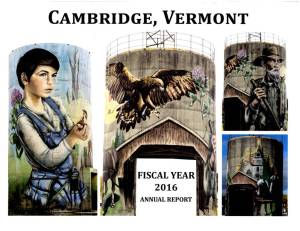
Cover of Cambridge Annual Report 2016
Two concrete silos stand in the village of Jeffersonville (town of Cambridge) where the Bell-Gates Lumber Corporation once had a sawmill. In 2016 large murals were painted on the silos. The silo murals were featured on the cover of the 2016 annual report for Cambridge (cover at left, full report online here).
The inside of the annual report includes an explanation of the silo murals. The aging farmer on one silo represents the past. The youth on the other silo represents the present and future. Various images on both silos depict human culture and the natural environment in the area. More information is in this article in Seven Days:
New Silo Murals Link Jeffersonville’s Past and Future
The Cambridge Annual Report also includes a beautiful poem which mentions the silo murals among other positive developments in town in 2016:
Bringing Old Things Back to Life in Support of Community
The silo murals remind me of another poem, a famous poem about growing up from a child to an adult. The youth on the south silo is full of potential but is not yet an adult. Perhaps the aging farmer is sharing these thoughts with the youth:
If—
If you can keep your head when all about you
Are losing theirs and blaming it on you,
If you can trust yourself when all men doubt you,
But make allowance for their doubting too;
If you can wait and not be tired by waiting,
Or being lied about, don’t deal in lies,
Or being hated, don’t give way to hating,
And yet don’t look too good, nor talk too wise:
If you can dream—and not make dreams your master;
If you can think—and not make thoughts your aim;
If you can meet with Triumph and Disaster
And treat those two impostors just the same;
If you can bear to hear the truth you’ve spoken
Twisted by knaves to make a trap for fools,
Or watch the things you gave your life to, broken,
And stoop and build ’em up with worn-out tools:
If you can make a heap of all your winnings
And risk it on one turn of pitch-and-toss,
And lose, and start again at your beginnings
And never breathe a word about your loss;
If you can force your heart and nerve and sinew
To serve your turn long after they are gone,
And so hold on when there is nothing in you
Except the Will which says to them: “Hold on!”
If you can talk with crowds and keep your virtue,
Or walk with Kings—nor lose the common touch,
If neither foes nor loving friends can hurt you,
If all men count with you, but none too much;
If you can fill the unforgiving minute
With sixty seconds’ worth of distance run,
Yours is the Earth and everything that’s in it,
And—which is more—you’ll be [an adult], my [child]!
Rudyard Kipling published this poem in 1910 with his son John in mind. He was 44 and John was 13, five years older than the youth in the silo mural. I updated the last line for the 19th Amendment, adopted ten years later.
As an interesting aside, Rudyard Kipling’s wife and John’s mother was a Vermonter. Rudyard and his wife, Caroline (Carrie) Balestier, lived in Vermont for the first few years of their marriage (1892-1896). Their home near Brattleboro, called Naulakha, is owned by The Landmark Trust USA and is available for vacation rentals.
Kipling probably wrote “If—” a few years before he published it. Wikipedia says he wrote it in 1895 which means he would have written it while living in Vermont as a newlywed at age 29 before John was born.

Sounds like he advocates a rugged individualism. I am not sure that makes today’s “man”.
LikeLike
I wonder what the young men (and women) who prevented Charles Murray from speaking at Middlebury College on March 2, 2017 would say about “If–.” And I wonder what J.D. Vance, a young man who published “Hillbilly Elegy” in June 2016, would say about it.
LikeLike